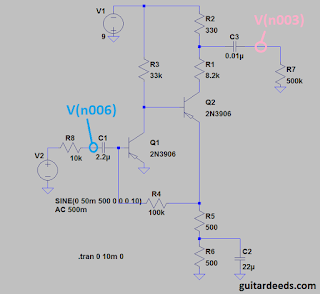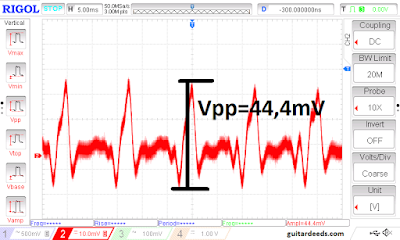english | deutsch
What Is The Output Impedance And Why Do I Even Care About It?
The output impedance or source impedance Ri of a perfect signal source is 0Ω. When talking about DC voltage sources it is also called internal resistance (That's why I call it Ri even though a guitar pickup is an AC signal source). A (passive) guitar pickup is by no means a perfect signal source (Ri > 0Ω). This means that the output voltage will drop when connected to a load (effects pedals, amplifier). This effect will be more significant the higher the output impedance of your guitar pickup and the lower the input impedance of your amplifier/effects pedal is (voltage divider between Ri and RL). |
| voltage divider between output impedance Ri of the guitar and input impedance RL of the load |
Example:
Recently I simulated the circuit of a Fuzz Face with LTspiceIV and realized that the output impedance of the guitar affects the final output waveform of the effects pedal.
Fuzz Face Schematic:
Output Waveform Of A Fuzz Face With Perfect Signal Source (Ri=0Ω) At Input:
Output Waveform Of A Fuzz Face With Realistic Signal Source (Ri=10kΩ) At Input:
You have to find out for yourself if you like the sound of those interactions or not. If you don't like it you should reconsider the order in which your guitar effects are arranged in your signal chain. A Buffer pedal has a high input and a low output impedance. It can be used to preserve the original waveform coming from your guitar pickups when used as the first pedal in your signal chain. Active guitar pickups are even better than buffer pedals because the guitar cable is a (capacitive) load too.
How To Measure The Output Impedance Of Your Guitar Pickup?
For measuring the source impedance of your guitar you will need an oscilloscope. If you don't have one you can use my results because it won't differ that much. By the way the exact model name of my guitar pickup is a Seymour Duncan SH-4 JB in bridge position.- Measure The Peak-Peak Voltage With Open Output:
Turn your guitar up to full volume to make sure that the pots don't influence your measurement. Then strum a note (I strummed the thicker E string).
- Measure The Peak-Peak Voltage With A Load (RL=1kΩ):
Strum the same note with the same intensity as before to get the best results. - Calculate The Output Impedance Of Your Guitar Pickup:
Finally we can take the voltage divider formulas from above and substitute the variables with our measured values. Result: The output impedance of my guitar is about 10kΩ.
Please comment, like and share!









That enables you to sustain the first waveform via the electric guitar pickups any time employed because the initial pedal within your sign sequence. Lively electric guitar pickups are usually better yet as compared to stream pedals as the electric guitar cable tv can be a insert also.
ReplyDeleteAny Stream pedal features a large feedback plus a lower end result impedance. That enables you to sustain the first waveform via the electric guitar pickups any time employed because the initial pedal within your sign sequence.
ReplyDeleteBecause guitar pickup is not a simple resistor, you can't measure by that way. Your measurement far from correct in all way.
ReplyDeleteDC resistance can be measured with a DC multimeter. But the full impedance of a pick up is frequency dependent.
Csőcsákány:)
Thanks for your comment!
DeleteActually my measurement is pretty accurate. Please read carefully! I didn't use a DC multimeter. I'm always talking about an AC signal source. Don't be confused by the term Ri, you can also call it Zi if you want!
One of the favored guitar effects being used worldwide is the stomp box. This is really in the shape of a pedal that's placed on the ground. You then stomp on it, to exert control of this guitar effect. This creates a distortion musical study effect on the music, which is more related to the class of rock and metal.
ReplyDeleteGreat readding
ReplyDelete